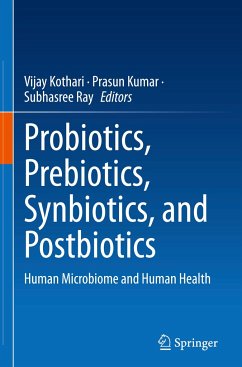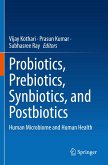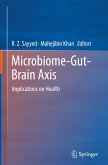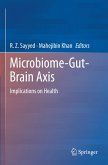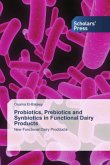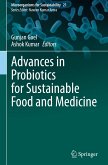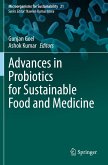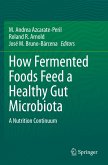Probiotics, Prebiotics, Synbiotics, and Postbiotics
Human Microbiome and Human Health
Herausgegeben:Kothari, Vijay; Kumar, Prasun; Ray, Subhasree
Probiotics, Prebiotics, Synbiotics, and Postbiotics
Human Microbiome and Human Health
Herausgegeben:Kothari, Vijay; Kumar, Prasun; Ray, Subhasree
- Gebundenes Buch
- Merkliste
- Auf die Merkliste
- Bewerten Bewerten
- Teilen
- Produkt teilen
- Produkterinnerung
- Produkterinnerung
This book explains the potential value of microbiome and microbiome composition associated with human health and diseases. The opening chapters describe the current state of knowledge regarding the human microbiome structure, function, and diversity. The mechanisms of action and the various putative uses of human microbiome are then examined specific to healthy and disease conditions. Readers will find detailed information on its manipulation of human microbiome studies as well as its applied and translational aspects in the current field. The latest knowledge on probiotics, prebiotics,…mehr
Andere Kunden interessierten sich auch für
![Probiotics, Prebiotics, Synbiotics, and Postbiotics Probiotics, Prebiotics, Synbiotics, and Postbiotics]() Probiotics, Prebiotics, Synbiotics, and Postbiotics187,99 €
Probiotics, Prebiotics, Synbiotics, and Postbiotics187,99 €![Microbiome-Gut-Brain Axis Microbiome-Gut-Brain Axis]() Microbiome-Gut-Brain Axis134,99 €
Microbiome-Gut-Brain Axis134,99 €![Microbiome-Gut-Brain Axis Microbiome-Gut-Brain Axis]() Microbiome-Gut-Brain Axis90,99 €
Microbiome-Gut-Brain Axis90,99 €![Probiotics, Prebiotics and Synbiotics in Functional Dairy Products Probiotics, Prebiotics and Synbiotics in Functional Dairy Products]() Osama El-BatawyProbiotics, Prebiotics and Synbiotics in Functional Dairy Products52,99 €
Osama El-BatawyProbiotics, Prebiotics and Synbiotics in Functional Dairy Products52,99 €![Advances in Probiotics for Sustainable Food and Medicine Advances in Probiotics for Sustainable Food and Medicine]() Advances in Probiotics for Sustainable Food and Medicine149,99 €
Advances in Probiotics for Sustainable Food and Medicine149,99 €![Advances in Probiotics for Sustainable Food and Medicine Advances in Probiotics for Sustainable Food and Medicine]() Advances in Probiotics for Sustainable Food and Medicine149,99 €
Advances in Probiotics for Sustainable Food and Medicine149,99 €![How Fermented Foods Feed a Healthy Gut Microbiota How Fermented Foods Feed a Healthy Gut Microbiota]() How Fermented Foods Feed a Healthy Gut Microbiota112,99 €
How Fermented Foods Feed a Healthy Gut Microbiota112,99 €-
-
-
This book explains the potential value of microbiome and microbiome composition associated with human health and diseases. The opening chapters describe the current state of knowledge regarding the human microbiome structure, function, and diversity. The mechanisms of action and the various putative uses of human microbiome are then examined specific to healthy and disease conditions. Readers will find detailed information on its manipulation of human microbiome studies as well as its applied and translational aspects in the current field. The latest knowledge on probiotics, prebiotics, synbiotics, and postbiotics is presented, and specific cases to date are discussed. This book features knowledge from leading researchers working on different aspects of the human microbiome and its manipulation for better health. Overall, this book is an excellent source for microbiome researchers and students from all levels seeking the most up-to-date advancements in the field and also to point toward the future directions.
Produktdetails
- Produktdetails
- Verlag: Springer / Springer Nature Singapore / Springer, Berlin
- Artikelnr. des Verlages: 978-981-99-1462-3
- 2023
- Seitenzahl: 604
- Erscheinungstermin: 10. Juni 2023
- Englisch
- Abmessung: 241mm x 160mm x 36mm
- Gewicht: 1172g
- ISBN-13: 9789819914623
- ISBN-10: 9819914620
- Artikelnr.: 67508260
- Herstellerkennzeichnung Die Herstellerinformationen sind derzeit nicht verfügbar.
- Verlag: Springer / Springer Nature Singapore / Springer, Berlin
- Artikelnr. des Verlages: 978-981-99-1462-3
- 2023
- Seitenzahl: 604
- Erscheinungstermin: 10. Juni 2023
- Englisch
- Abmessung: 241mm x 160mm x 36mm
- Gewicht: 1172g
- ISBN-13: 9789819914623
- ISBN-10: 9819914620
- Artikelnr.: 67508260
- Herstellerkennzeichnung Die Herstellerinformationen sind derzeit nicht verfügbar.
Vijay Kothari is a microbiologist. His current research is in the areas of AMR (antimicrobial resistance), Traditional Medicine, prebiotic and immunomodulatory properties of natural products, microbial response to sonic stimulation, etc. His group is actively involved in investigating antimicrobial/ anti-virulence potential of natural products as well as synthetic compounds. In recent past, his lab has extensively investigated the anti-pathogenic/ prophylactic activity of various traditional medicine formulations e.g. Panchvalkal, Panchgavya, Triphala, etc. against different antibiotic-resistant bacterial strains. His lab was awarded SRISTI-DBT-BIRAC Appreciation Award (2017) for validation of anti-infective potential of a polyherbal formulation inspired from folk medicine- Herboheal. He has also been awarded two AIMS (Artificial Intelligence Molecular Screen) award (2020-22) projects by Atomwise Inc., USA for identifying novel anti-infective leads.Dr. Kothari has also contributed substantially to the field as an active editor and reviewer, and has been conferred the Sentinel of Science award (2016) by Publons recognizing his contribution as a peer reviewer. He has 88 research/ review/ book chapter publications to his credit. His publications have enjoyed a wide readership as evident from more than 2,53,000 reads from ResearchGate alone. Vijay derives great satisfaction from the hitherto output of the M.Sc. dissertations guided by him. During the period 2007-2019, he guided 84 M.Sc. students for their dissertation projects, of which 71 (i.e. 84.52%) could publish research/ review papers in different peer-reviewed, indexed journals (or a citable preprint), based on their Masters' dissertation. Prasun Kumar holds a Ph.D. in Biotechnology from CSIR-Institute of Genomics and Integrative Biology, Delhi, India. He is presently working as a Scientific Officer at DBT-IOC Center for Advanced Bioenergy Research, Faridabad. Earlier, he was working as an Assistant Professor at the Department of Chemical Engineering, Yeungnam University, Republic of Korea. He has over seven years of experience in applied microbiological research including about 2 years of experience in industrial R&D. His main areas of research are biopolymers, microbial biodiversity, bioenergy, microbial biofilms, quorum sensing, quorum quenching, and genomics. His present research is oriented toward valorizing lignocellulosic biowastes into value-added products such as biopolymer, 2G ethanol, bioenergy, and antibiofilm compounds. To his credit, there are over 34 articles in SCI journals, 5 books, and 11 chapters with international publishers. He has been serving the scientific society by reviewing articles for several SCI journals and delivering guest lectures. Publons awarded him the peer review award in the year 2018. He also serves as the editorial board member of a few international journals. Dr.Subhasree is currently working as an Assistant professor at Sharda University, Greater Noida, Uttar Pradesh, India. She earned her Ph.D. degree from CSIR-IGIB, Delhi, in 2018. She received the prestigious CSIR-SRF fellowship. Her main research was focused on producing biopolymers from waste biomass. After Ph.D., she joined as a postdoctoral researcher at Ewha University and the University of Seoul, South Korea. Here, her main focus was the anaerobic digestion of food wastes for methane production. She also studied methanogenesis at a 4000L pilot-scale plant. After the successful completion of 1 year, she joined another project at Yeungnam University, South Korea. During that period, she worked on several fungal toxins and their inhibition from fermented food. She also worked on biofilm inhibition of pathogenic organisms by natural bioactive compounds. To her credit, she has 13 research papers published in peer-reviewed journals and 8 book chapters. In addition, she is a life member ofvarious scientific societies and also a member of various committees at Sharda University for Graduate and Undergraduate programs.
Part I: Current State of Knowledge regarding the Human Microbiome Structure, Function, and Diversity.- Chapter 1. Impact of Dietary Habits, Ethnicity and Geographical Provenance in Shaping Human Gut Microbiome.- Chapter 2. Methods Used for Studying Human Microbiome.- Chapter 3. Factors Affecting Composition of the Human Microbiome.- Part II: Correlation of the Human Microbiome to Specific Health/Disease Conditions.- Chapter 4. Mapping the Microbial Metabolites in Metabolic Disorders.- Chapter 5. Human Microbiome in Malnutrition.- Chapter 6. Human Microbiome and the Immune System Functioning.- Chapter 7. Human Microbiome and the Susceptibility to Infections.- Chapter 8. Human microbiome and the neurological disorders.- Chapter 9. Exploring the Unexplored Arena: Butyrate As a Dual Communicator in the Gut-Brain Axis.- Chapter 10. Human Microbiome and Lifestyle Disorders.- Chapter 11. Correlation of Human Microbiome and Immune Functioning to Covid-19 Infections:An Overview.- Chapter 12. Exploring the Pathoprofiles of SARS-COV-2-infected Human Gut-Lungs Microbiome Crosstalks.- Chapter 13. Role of Human Microbiome in Cardiovascular Disease: Therapeutic Potential and Challenges.- Chapter 14. The Human Microbiome and Respiratory Diseases.- Part-III: Manipulation of the Human Microbiome for Better Health.- Chapter 15. Probiotics: An Emerging Strategy for Oral Health Care.- Chapter 16. Dietary Modulation of Nervous and Immune System: Role of Prebiotics/ Synbiotics/ Postbiotics.- Chapter 17. Probiotics for Skin Health.- Chapter 18. Human Microbiome and Autism-Spectrum Disorders.- Chapter 19. Psychobiotics as an Emerging Category of Probiotic Products.- Chapter 20. Probiotics for Vaginal Health.- Chapter 21. Interactions between Microbial Therapeutics and the Endogenous Microbiome.- Part IV: Applied and Translational Aspects.- Chapter 22. The Role of a Multi-Spore Probiotic in the Management of Metabolic Endotoxemia - A Major Driver of Chronic Illness.- Chapter 23. Characterization and Authentication of Probiotic Preparations.- Chapter 24. A Survey of Commercially Available Probiotics and Prebiotics.- Chapter 25. Regulatory Aspects Relevant to Probiotic Products.- Chapter 26. Probiotic Identity from Spore - Focus on Bacillus Probiotics.
Part I: Current State of Knowledge regarding the Human Microbiome Structure, Function, and Diversity.- Chapter 1. Impact of Dietary Habits, Ethnicity and Geographical Provenance in Shaping Human Gut Microbiome.- Chapter 2. Methods Used for Studying Human Microbiome.- Chapter 3. Factors Affecting Composition of the Human Microbiome.- Part II: Correlation of the Human Microbiome to Specific Health/Disease Conditions.- Chapter 4. Mapping the Microbial Metabolites in Metabolic Disorders.- Chapter 5. Human Microbiome in Malnutrition.- Chapter 6. Human Microbiome and the Immune System Functioning.- Chapter 7. Human Microbiome and the Susceptibility to Infections.- Chapter 8. Human microbiome and the neurological disorders.- Chapter 9. Exploring the Unexplored Arena: Butyrate As a Dual Communicator in the Gut-Brain Axis.- Chapter 10. Human Microbiome and Lifestyle Disorders.- Chapter 11. Correlation of Human Microbiome and Immune Functioning to Covid-19 Infections:An Overview.- Chapter 12. Exploring the Pathoprofiles of SARS-COV-2-infected Human Gut-Lungs Microbiome Crosstalks.- Chapter 13. Role of Human Microbiome in Cardiovascular Disease: Therapeutic Potential and Challenges.- Chapter 14. The Human Microbiome and Respiratory Diseases.- Part-III: Manipulation of the Human Microbiome for Better Health.- Chapter 15. Probiotics: An Emerging Strategy for Oral Health Care.- Chapter 16. Dietary Modulation of Nervous and Immune System: Role of Prebiotics/ Synbiotics/ Postbiotics.- Chapter 17. Probiotics for Skin Health.- Chapter 18. Human Microbiome and Autism-Spectrum Disorders.- Chapter 19. Psychobiotics as an Emerging Category of Probiotic Products.- Chapter 20. Probiotics for Vaginal Health.- Chapter 21. Interactions between Microbial Therapeutics and the Endogenous Microbiome.- Part IV: Applied and Translational Aspects.- Chapter 22. The Role of a Multi-Spore Probiotic in the Management of Metabolic Endotoxemia - A Major Driver of Chronic Illness.- Chapter 23. Characterization and Authentication of Probiotic Preparations.- Chapter 24. A Survey of Commercially Available Probiotics and Prebiotics.- Chapter 25. Regulatory Aspects Relevant to Probiotic Products.- Chapter 26. Probiotic Identity from Spore - Focus on Bacillus Probiotics.

